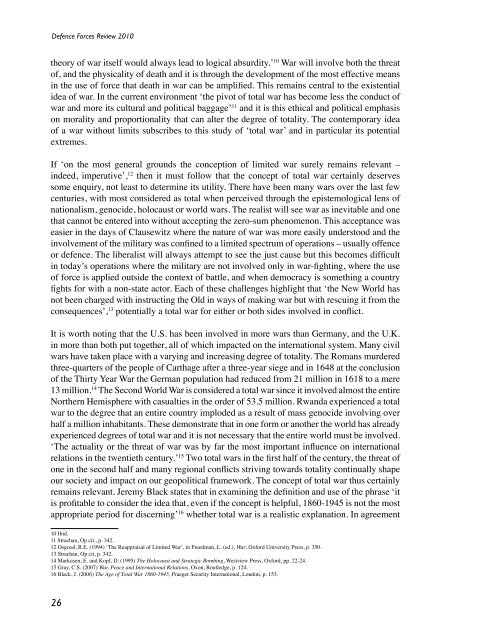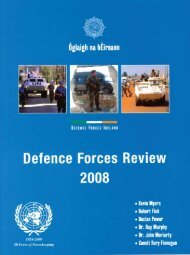Defence Forces Review 2010
Defence Forces Review 2010
Defence Forces Review 2010
Create successful ePaper yourself
Turn your PDF publications into a flip-book with our unique Google optimized e-Paper software.
<strong>Defence</strong> <strong>Forces</strong> <strong>Review</strong> <strong>2010</strong>theory of war itself would always lead to logical absurdity.’ 10 War will involve both the threatof, and the physicality of death and it is through the development of the most effective meansin the use of force that death in war can be amplified. This remains central to the existentialidea of war. In the current environment ‘the pivot of total war has become less the conduct ofwar and more its cultural and political baggage’ 11 and it is this ethical and political emphasison morality and proportionality that can alter the degree of totality. The contemporary ideaof a war without limits subscribes to this study of ‘total war’ and in particular its potentialextremes.If ‘on the most general grounds the conception of limited war surely remains relevant –indeed, imperative’, 12 then it must follow that the concept of total war certainly deservessome enquiry, not least to determine its utility. There have been many wars over the last fewcenturies, with most considered as total when perceived through the epistemological lens ofnationalism, genocide, holocaust or world wars. The realist will see war as inevitable and onethat cannot be entered into without accepting the zero-sum phenomenon. This acceptance waseasier in the days of Clausewitz where the nature of war was more easily understood and theinvolvement of the military was confined to a limited spectrum of operations – usually offenceor defence. The liberalist will always attempt to see the just cause but this becomes difficultin today’s operations where the military are not involved only in war-fighting, where the useof force is applied outside the context of battle, and when democracy is something a countryfights for with a non-state actor. Each of these challenges highlight that ‘the New World hasnot been charged with instructing the Old in ways of making war but with rescuing it from theconsequences’, 13 potentially a total war for either or both sides involved in conflict.It is worth noting that the U.S. has been involved in more wars than Germany, and the U.K.in more than both put together, all of which impacted on the international system. Many civilwars have taken place with a varying and increasing degree of totality. The Romans murderedthree-quarters of the people of Carthage after a three-year siege and in 1648 at the conclusionof the Thirty Year War the German population had reduced from 21 million in 1618 to a mere13 million. 14 The Second World War is considered a total war since it involved almost the entireNorthern Hemisphere with casualties in the order of 53.5 million. Rwanda experienced a totalwar to the degree that an entire country imploded as a result of mass genocide involving overhalf a million inhabitants. These demonstrate that in one form or another the world has alreadyexperienced degrees of total war and it is not necessary that the entire world must be involved.‘The actuality or the threat of war was by far the most important influence on internationalrelations in the twentieth century.’ 15 Two total wars in the first half of the century, the threat ofone in the second half and many regional conflicts striving towards totality continually shapeour society and impact on our geopolitical framework. The concept of total war thus certainlyremains relevant. Jeremy Black states that in examining the definition and use of the phrase ‘itis profitable to consider the idea that, even if the concept is helpful, 1860-1945 is not the mostappropriate period for discerning’ 16 whether total war is a realistic explanation. In agreement10 Ibid.11 Strachan, Op cit., p. 342.12 Osgood, R.E. (1994) ‘The Reappraisal of Limited War’, in Freedman, L. (ed.), War, Oxford University Press, p. 350.13 Strachan, Op cit, p. 342.14 Markusen, E. and Kopf, D. (1995) The Holocaust and Strategic Bombing, Westview Press, Oxford, pp. 22-24.15 Gray, C.S. (2007) War, Peace and International Relations, Oxon, Routledge, p. 124.16 Black, J. (2006) The Age of Total War 1860-1945, Praeger Security International, London, p. 153.26
















